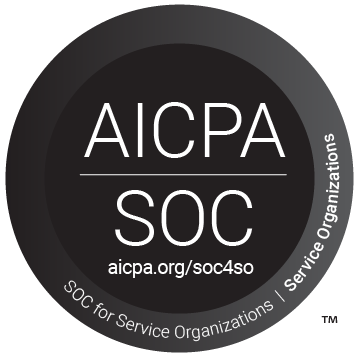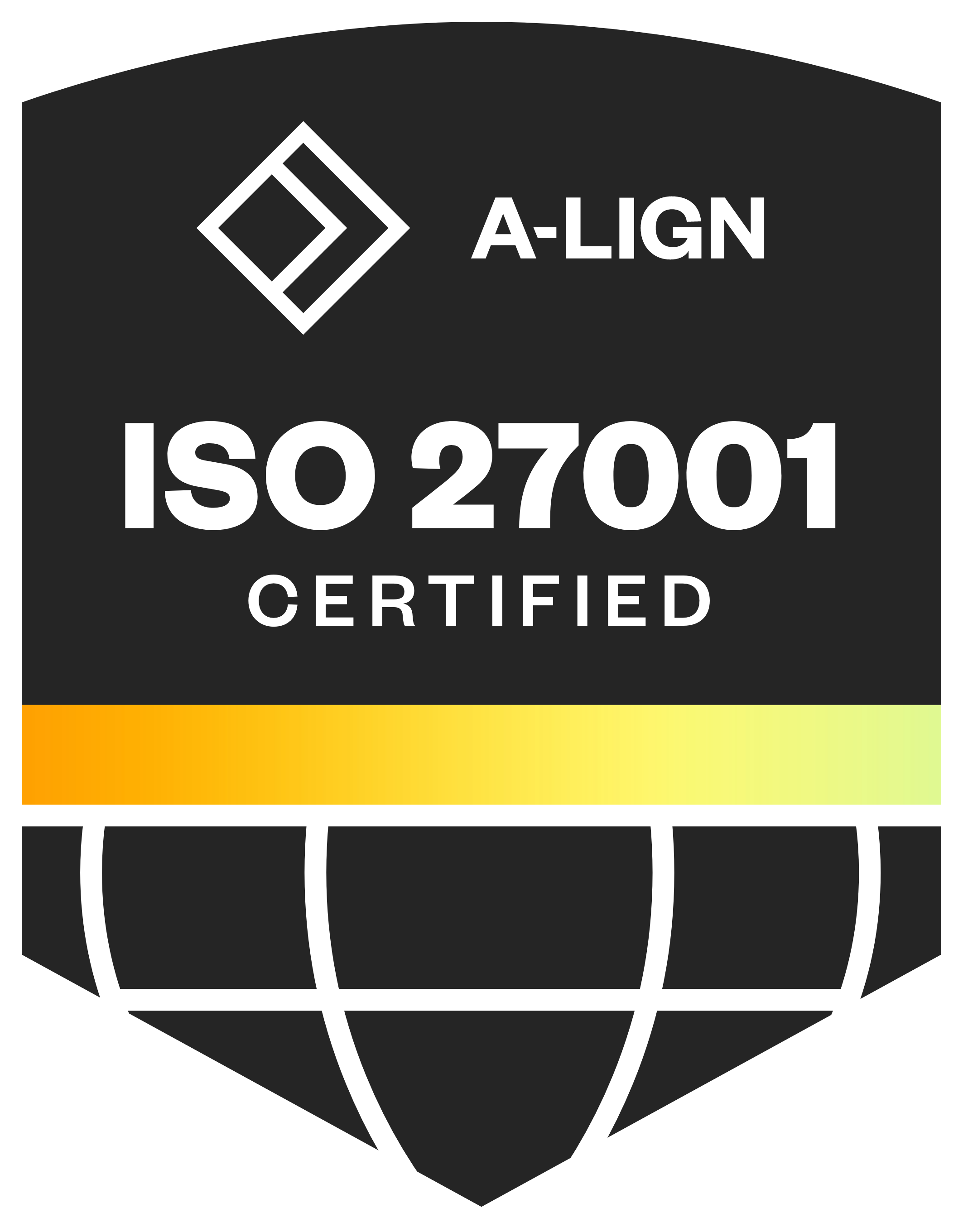Unlock the power of short-form video
Intuitive tools to create repeatable, on-brand, compliant video that breaks through.

Ways to put CreatorSuite to work
Employee stories
Bring a day in the life of a teammate to life
Brand ambassadors
Turn employee voices into brand stories.
Executive social
Elevate executives as social thought leaders.
Employee advocacy
Empower employees to advocate.
Sales outreach
Enable sales to connect with impact.
Product insights
Showcase products through customer perspectives.
Short explainers
Transform complex ideas into clear explainers.
Culture content
Highlight culture with authenticity.
Employee stories
Bring a day in the life of a teammate to life
Brand ambassadors
Turn employee voices into brand stories.
Executive social
Elevate executives as social thought leaders.
Employee advocacy
Empower employees to advocate.
Sales outreach
Enable sales to connect with impact.
Product insights
Showcase products through customer perspectives.
Short explainers
Transform complex ideas into clear explainers.
Culture content
Highlight culture with authenticity.
Give your teams the tools to create snackable video faster
Recording Booth
Easy, self-guided recording with a built-in teleprompter for desktop or mobile. Files are never stored locally, keeping content secure.
Editor
Rapid, template-based editing tools that anyone can use. With a simple drag-and-drop interface, it’s easy to add subtitles, graphics, and branding.
And everything else you need to create short-form video at scale
Connect and publish to your existing enterprise applications
Seamlessly publish across social, hosting, work, storage, and LMS platforms to streamline workflows, support easy reviews, and meet compliance standards.
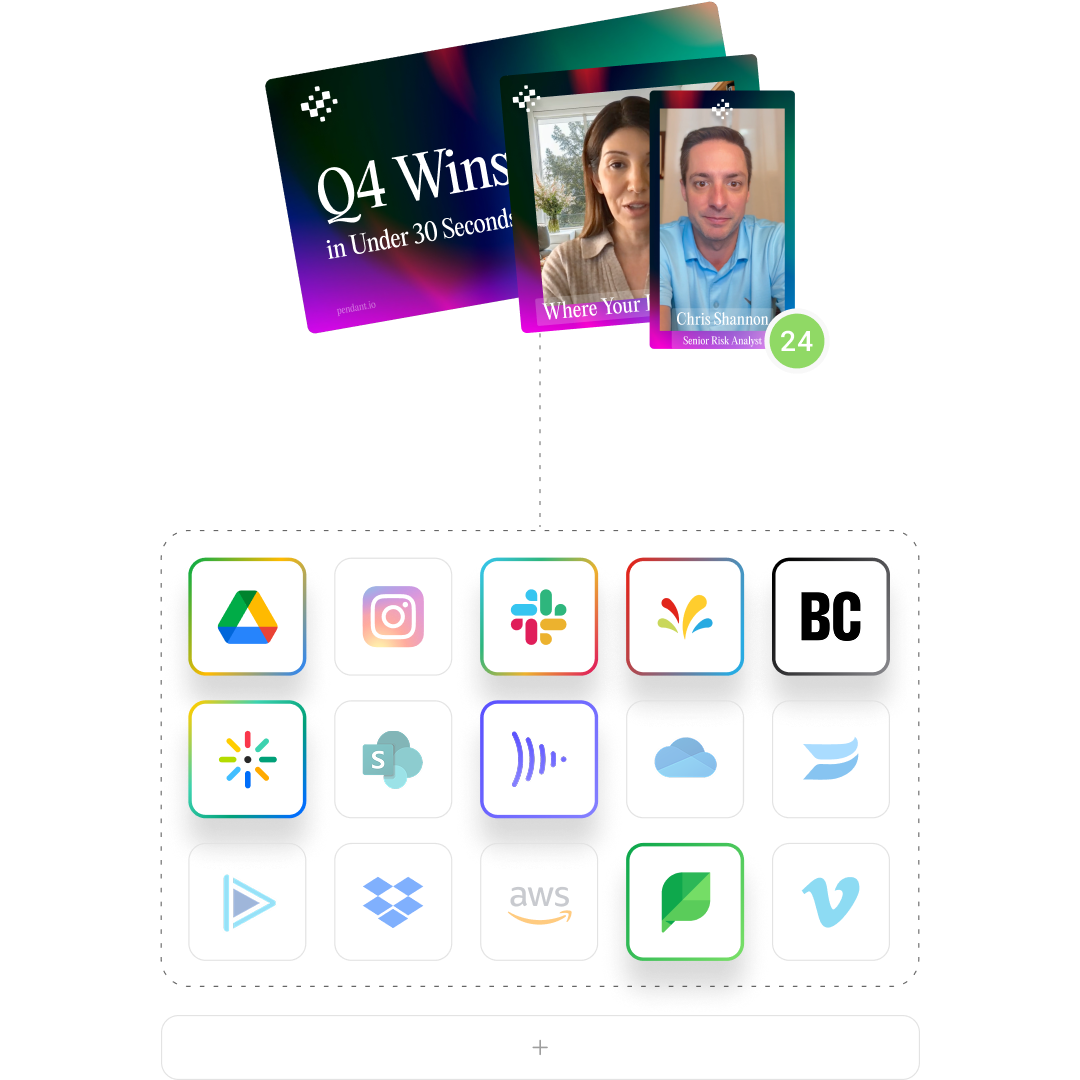
Scale video creation with speed ⚡ and control 🔒
Editing for everyone
If you can use a Word document, you can edit videos in CreatorSuite. Templates, subtitles, and graphics make every video polished and compliant.
Simple recording
So simple, you can get more people recording in a consistent, repeatable way. Every session is auto-saved to your content library in the highest quality.
Project management
Spaces, permissions, and shared assets give people exactly what they need — nothing more, nothing less.
Recent CreatorSuite news
From March 8–11 in Miami Beach, Socialive is joining FINNY and Integrated Partners at Future Proof Citywide to launch a hands-on Advisor Video Bootcamp experience designed specifically for financial advisors.
The goal is simple: give advisors a practical, guided way to experience how short-form video and AI-powered prospecting can work together to modernize outreach.
Hosted at the FINNY booth, the Advisor Video Bootcamp is built as a live, on-the-ground activation where advisors don’t just hear about video — they create it.
What is the advisor video bootcamp?
The Advisor Video Bootcamp is a structured, 15-minute recording session where advisors create a polished, 60-second professional introduction video — their personal advisor story, like the below example from Ann Hynek from Hestia Wealth and Wellness.
During each session, advisors:
- Clarify who they serve and their niche focus
- Articulate why they became an advisor
- Highlight their expertise and experience
- Record a professional-quality introduction video
- Leave with a finished asset ready to use immediately
Using Socialive’s browser-based platform, advisors are guided step-by-step through a coach-led experience that includes:
- Light, structured coaching
- A built-in teleprompter
- AI-powered eye-contact correction
- Studio-quality audio enhancement
- Automated finishing touches
No production crew. No editing software. No friction. Just a clear process that results in a usable prospecting asset.
Why video matters for modern advisors
Today’s advisor prospect expects personalization, clarity, and authenticity. Traditional cold outreach often gets ignored. Static profiles blend in.
But a short, well-crafted video allows prospects to see and hear the person behind the credentials. It builds trust faster and creates a stronger first impression.
Each Advisor Video Bootcamp recording focuses on what prospects care about most:
- Why you chose this profession
- Who you serve best
- Your niche expertise
- The value you bring to client relationships
Every video closes with a simple, human invitation to connect — making it versatile across:
- LinkedIn profiles
- LinkedIn prospecting messages
- Email outreach
- Follow-up after meetings
It becomes a reusable asset that fits naturally into modern advisor workflows.
How the experience comes together
This activation brings together complementary strengths:
Socialive powers the AI-driven video creation experience, enabling compliant, polished video in minutes.
FINNY brings intelligent, high-intent prospect targeting — continuously analyzing financial life events and niche alignment to help advisors connect with the right prospects at the right time.
Integrated Partners contributes deep advisor enablement expertise and a content-first approach to growth.
Together at Future Proof Citywide, the Advisor Video Bootcamp demonstrates how authentic storytelling and intelligent targeting can elevate advisor outreach.
What to expect at the FINNY booth
Advisors can pre-book a 15-minute recording session, with a limited number of walk-up slots available during the event.
Each participant leaves with a professionally enhanced video delivered digitally and ready for immediate use.
Space is limited, and advance registration is encouraged.
We’re excited to bring this experience to Future Proof Citywide and to help advisors see what’s possible when AI, video, and intelligent prospecting come together.
If you’re attending in Miami, sign up, stop by the FINNY booth, and record your advisor story.
New enterprise snackable video creation solution unlocks the ability to quickly source, guide, and create video of employees, executives, and experts with speed, control, and compliance for company-wide impact.
LOS ANGELES — August 6th, 2025 — Socialive, the AI-powered enterprise video creation platform, today announced the launch of CreatorSuite, the enterprise-ready toolbox for scaling short-form video across large-scale organizations.
Purpose-built to meet the surging demand for snackable, people-powered video, CreatorSuite empowers both video and non-video professionals to source, guide, and create compliant content from employees, executives, and subject-matter experts — faster than ever. With self-guided recording tools, brand-safe templates, and automated approval workflows, teams can now deliver high-quality, on-message video — without production bottlenecks or risk.
“Short-form video powers today's online world, infusing reach, trust, and action — and now enterprise organizations have a reliable way to harness the power of snackable video,” said David Moricca, CEO and Founder of Socialive. “CreatorSuite removes the bottlenecks associated with resource-heavy video production. With templates, guided recordings, text-based editing, and compliance sitting at the foundation of it all, any functional area across a modern business can now turn its most important messaging into polished, on-brand, compliant video in minutes.”
Purpose-Built for Enterprise-Grade Scale, Speed, and Control
CreatorSuite addresses the top barriers to short-form video creation at scale: the difficulty of collecting content from busy, camera-shy executives and SMEs, the manual effort required to edit, maintain brand consistency, and the risk of publishing off-message or non-compliant assets.
- Recording Booth offers a professional, self-guided environment that employees can access on their own schedules.
- Smart invitations, prompts, and an on-screen teleprompter remove guesswork so contributors know exactly what to say and how to say it.
- Projects keep large video initiatives organized, while recording invites ensure each recording lands in the right spot for fast, easy text-based editing.
- Pre-approved templates and brand overlays lock in pre-approved messaging, brand logos, colors, intros, and outros automatically, which are ready for rinse and repeat.
- Automated captions and role-based approvals let teams polish and complete videos in minutes — not weeks — while meeting brand, legal, and regional compliance requirements.
Proven Business Impact
Early adopters report up to a 10× increase in short-form video output and a 75% reduction in production turn time. By turning executives, field sellers, and employees into content contributors, organizations see broader reach, deeper engagement, and measurable growth in pipeline and employee engagement without expanding headcount.
Coming Later This Year: AISuite
AISuite, launching later in 2025, is Socialive’s new AI engine for unlocking more value from every video. Fully integrated with CreatorSuite for short-form video and ProducerSuite for long-form productions, AISuite enhances quality, surfaces key insights, amplifies reach, and streamlines workflows, helping enterprises deliver more high-quality, on-brand video at scale.
AISuite unlocks four key advantages
- Enhance: Make every recording look and sound flawless with AI-powered tools like eye contact, studio voice, beauty filter, video mastering, and super resolution.
- Highlight: Surface key moments instantly with automated clips, highlight reels, chapters, and summaries — turning hours of content into digestible, usable assets.
- Amplify: Extend reach across audiences and channels with AI-generated social posts, blogs, emails, translations, and dubbing — without added cost or effort.
- Streamline: Automate compliance checks, simplify content search, and accelerate approvals with batch workflows that reduce risk and speed time-to-market.
“With the launch of CreatorSuite, we’re redefining what it means to create enterprise snackable video. It’s no longer about choosing between speed and quality, or scale and compliance. We’ve built a platform that empowers every team — from marketing to leadership — to show up with authenticity and scale their message, without the typical video production roadblocks. This is the future of enterprise video creation technology: fast, flexible, compliant, and built for the way people actually communicate today.”
David Moricca
Founder & CEO, Socialive
In addition to AISuite, Socialive is developing AI-powered translation capabilities, which will let you localize video content and ensure compliance for diverse global audiences in 75 languages, increasing reach.
About Socialive
Socialive is an AI-powered enterprise video creation platform for highly-regulated and global organizations that need to scale short-form and long-form video — fast, cost-effectively, and without sacrificing quality, control, or compliance.
Press Contact
Jennifer Burak
VP, Marketing, Socialive
Key takeaways:
- CreatorSuite brings speed, structure, and compliance to short-form video creation
- Anyone in the org can now easily contribute to and/or create a polished, brand-safe video at scale
- CreatorSuite marks Socialive’s biggest product development to date
Written by Socialive CEO & Founder, David Moricca
The fastest-growing content format in the enterprise? Snackable video.
In today’s attention economy, snackable video drives 2.5x more engagement, and videos under 60 seconds see completion rates as high as 81%. When paired with a clear call to action, these videos don’t just get watched, they get results: driving everything from job applications to demos, content downloads to event registrations.
We've seen how our phones and social media have had a profound impact on how we consume content. The way we engage with content for work is more reflective of how we engage during our free time.
And thanks to algorithm favoritism on platforms like LinkedIn, Instagram, and Google, short-form video gets up to 8X more reach and 2.5X more engagement than traditional branded content. It’s one of the smartest ways to earn the attention that you don't have to pay for. For enterprise teams, the question is no longer why short-form video — but how to scale it.
That's why we built CreatorSuite
With CreatorSuite, teams across your organization — Marketing, Leadership Communications, Field Sales, Employer Brand, and L&D — can source, guide, edit, and publish short-form video from trusted voices across your organization in minutes, not weeks. It’s the easiest way to unlock the power of people-powered video companywide, while staying on-brand with compliance.
Where we’ve been — and where we’re going
When we first launched Socialive, it was to make video creation easier and more accessible for enterprise teams. Over time, our platform became the go-to for remote recording, podcasts, livestreams, and webinars.
We saw huge adoption during that time in 2020 and 2021. That period forced our team to constantly keep an eye out for shifts in the world that we often can't plan for.
But the world has changed. Communication today is faster, more visual, and more human. Our customers want to put more real people in their video communications — from their executives, employees, and experts — and it has to be at a high level of quality that represents the brand. The resulting snackable video has to be authentic, fast, on-message, and scalable. Of course, this impactful video is part of a strategic push that convinces your audience to take the actions that move them down the funnel.
So, we listened — and built the solution.
Why we’re introducing CreatorSuite
Authentic short-form video is now essential to enterprise success. It drives reach, trust, and action — whether it’s an executive update, thought leadership post, employee spotlight, or field sales tip.
But creating it at scale? That’s been hard. Especially if you’re juggling:
- Busy contributors who are on the road
- Uncomfortable, camera-shy employees
- Brand and compliance risk across teams
- Manual workflows and content bottlenecks
CreatorSuite changes all that.
What is CreatorSuite?
CreatorSuite is your customizable toolbox for short-form video creation. It brings structure, guidance, and automation to every stage of the workflow — without requiring video expertise.
Key features include:
- Recording Booth: A self-guided recording environment that contributors can access anytime
- Recording Invites: Send invitations with prompts, scripts, and deadlines to collect content at scale
- Teleprompter: Keep contributors confident and on-message with on-screen script guidance
- Text-Based Editing and Subtitles: Edit videos and subtitles like a doc — just highlight, delete, or edit words
- Templates & Placeholders: Provide a structure for repeatable, on-brand content
- Projects & Approvals: Organize initiatives and move content from draft to publish, fast
All of it is wrapped in enterprise-grade guardrails for control and compliance.
What else makes up Socialive’s platform?
Including CreatorSuite, the Socialive platform is built on four integrated layers of enterprise value — working together to help you scale human-first video creation with speed, security, and strategic impact.
ProducerSuite – Produce like a pro, from anywhere
Produce high-quality livestreams, webinars, and podcasts right from your browser — without the need for a production crew. With powerful Studio and Green Room features, ProducerSuite puts your team in full control of every production, live or simulated live.
Studio features
- Run-of-Show: Plan and cue your segments with precision
- Brand Elements & Overlays: Add logos, lower-thirds, bumpers, and visuals
- Name Tags & Music: Personalize presenters and polish with audio
- Livestreaming & Multistreaming: Stream to one or multiple destinations simultaneously
- Producer Controls: New! Remotely manage guest devices for a smooth experience
Green Room features
- Team Chat: Stay in sync with behind-the-scenes messaging
- Teleprompter: Help guests stay on-script, even in live or pre-recorded segments
- Screenshare & Slideshare: Present content seamlessly
- Tech Check: New! Auto-test mic, camera, and connectivity
- Individual Recordings: Capture individual high-quality audio and video tracks
Enterprise Controls – Govern creation at scale
From permissions to compliance, Enterprise Controls give you the tools to scale video creation with confidence:
- SSO & Role-Based Permissions: Secure access for every user
- Spaces: Segment content by team, department, or initiative
- Audit Logs & Compliance Automation: Stay compliant and audit-ready
- Auto-Upload & Tagging: Streamline storage and discoverability
Integrations – From creation to distribution, seamlessly
Push content directly into the platforms your teams already use. Socialive integrates across:
- Social & Marketing Platforms: LinkedIn, YouTube, Facebook, Instagram, Sprinklr, Sprout Social
- Video Hosting Platforms: Kaltura, Brightcove, Vimeo, Wistia, VBrick
- Collaboration Tools: Slack, SharePoint, Workplace
- Storage Solutions: Google Drive, OneDrive, Dropbox
AISuite (Coming Later in 2025) – Unlock more value from every video
AISuite, launching later in 2025, is Socialive’s new AI engine for unlocking more value from every video. Fully integrated with CreatorSuite for short-form video and ProducerSuite for long-form productions, AISuite enhances quality, surfaces key insights, amplifies reach, and streamlines workflows, helping enterprises deliver more high-quality, on-brand video at scale.
AISuite unlocks four key advantages:
- Enhance: Make every recording look and sound flawless with AI-powered tools like eye contact, studio voice, beauty filter, video mastering, and super resolution.
- Highlight: Surface key moments instantly with automated clips, highlight reels, chapters, and summaries — turning hours of content into digestible, usable assets.
- Amplify: Extend reach across audiences and channels with AI-generated social posts, blogs, emails, translations, and dubbing — without added cost or effort.
- Streamline: Automate compliance checks, simplify content search, and accelerate approvals with batch workflows that reduce risk and speed time-to-market.
In addition to AISuite, Socialive is developing AI-powered translation capabilities, which will let you localize video content and ensure compliance for diverse global audiences in 75 languages, increasing reach.
Welcome to the next era of Enterprise Video Creation
Socialive is the enterprise solution for modern video: fast, flexible, and built to meet the real demands of global organizations.
This is more than a product launch — it’s a vision for the future of enterprise communication: human-first, powered by AI, and ready for scale.
👉 Watch our “Snackable Success” Webinar: Webinar Replay
🎥 See the CreatorSuite in action with this 10-minute demo: Watch Demo
📰 Read our CreatorSuite press release: Read press release
- Employee video posts drive higher reach, engagement
- SMEs and thought leaders more trusted than brands
- CreatorSuite makes it simple to run an employee video program
Employee advocacy is a powerful top-funnel communications and marketing strategy, and we’ve seen staggering results with our own employee advocacy program.
The participants in our employee advocacy program have more than doubled the performance of our brand’s LinkedIn posts. Meaning, each individual saw their post outperform the single post from our Socialive LinkedIn account.
Why? LinkedIn posts from employees earn 8x more engagement and 24x more shares than posts from faceless corporate brands. And each person has their own unique network, which further amplifies overall reach with each employee who participates.
This is where CreatorSuite has been a game-changer for us. It provides ease of use for our employees — our content contributors — and streamlined everything for me as the program admin. We’re now able to make tons of content, fast, and stay on-brand every time.
People engage with other people, not brands, so using your people to deliver content and feature as an authentic connection point just makes sense. This logic follows for social media, outbound email, website content, you name it.
Here’s how we built this engagement-driving video program at Socialive.
The instant impact of employee advocacy
It didn’t take long to see results (I’ve got the spreadsheet to prove it). The first few posts from each of our employees performed about 5x higher than the same content on the Socialive page.
The funny thing is, these weren’t really folks who were active on social media. In fact, those who hadn’t posted in over a year saw the highest engagement of the cohort. So, “I don’t usually post” is a strength, not a weakness when picking participants.
Why employee content beats out brand content on LinkedIn
It’s truly a personal experience when actual people are involved.
When scrolling through the posts from our employees, you see tons of comments that have nothing to do with the actual content. But keep in mind that every “great to see you” or “we should get coffee next time you’re in town” further exposes the post — and our content — to a larger audience.
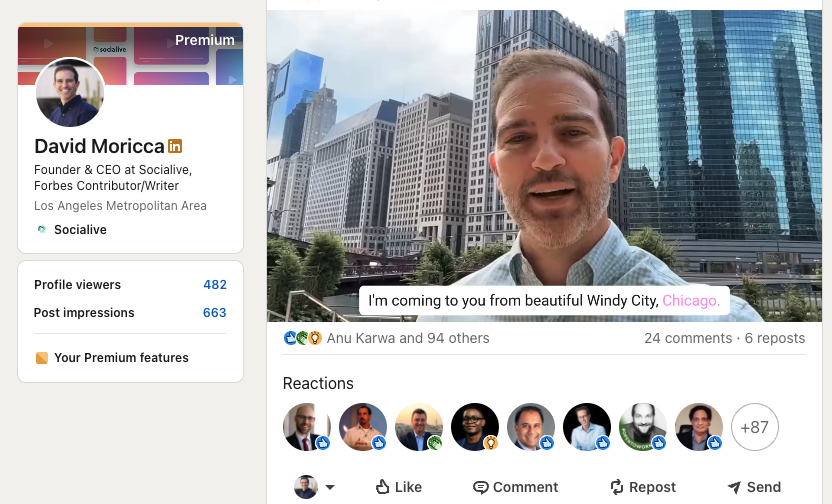
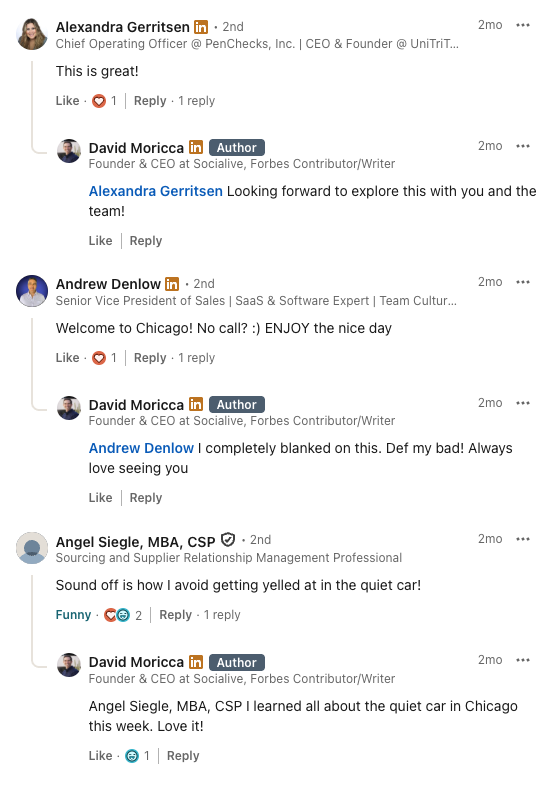
For every quick comment, invite to catch up, or well-wish, your brand’s reach is scaled exponentially. Your people are your strongest distribution network.
Step 1: Map content to key moments
OK, so that’s why we did this, now for the how.
We set up a content calendar that mapped to the overarching content roadmap. At Socialive, our content calendar syncs up with major product releases, targets a key buyer persona, and also highlights one of our target industries.
As a video creation technology vendor, of course, we create a number of videos to address those different audiences. We primarily use a short demo, a walkthrough video, or thought leadership that ties everything together.
Step 2: Work with leadership and teammates
Once we established what we would cover, it came time to build out the employee advocacy program. The behind-the-scenes work was necessary to keep everything simple for both the talent (all of my coworkers) and the creator (me).
The members of our employee advocacy group simply record a 10–15 second intro for a short video that touches on our product or thought leadership content. The resulting video is a 1–2 minute clip they will share from their LinkedIn.
Picking the right people for a video pilot program
Our leadership team has been involved from the beginning. They understand the power of short-form video and see value of organic social content. Leaders from our customer success, sales, and product teams picked out a few employees whom they determined:
- Have a strong network
- Can commit about 1 hour every two weeks
- Can confidently speak on camera (and follow a script)
- Were OK with being “voluntold” to participate
The key here was setting expectations early. I would do the heavy lifting; participants would just need to follow the prompts I sent through Socialive.
Once we identified our team, we had the makings of a pilot program.
Step 3: Make it effortless to record
The CreatorSuite made it simple for our participants to contribute their recordings. Each week, I set up a new template with branding, load the core content, draft and get approval on a script, and assign the project to a program member. The invite includes the recording link and script.
Just in case, I also set up a Slack channel where I post a Google Doc with the instructions and script for that week.
All my talent needs to do is click the recording link, do a quick rehearsal, and then they record on their own time. They are given the flexibility to adjust the script and social copy to fit their voice.
Step 4: Keep production a light lift for everyone
One of the biggest benefits of doing this process end-to-end in Socialive is that I can bifurcate the experience. I don’t want my speakers overwhelmed by all the production choices that I can make as the creator.
The ask is that they view the script, make it their own, and then record. I then make quick edits (if even needed).
Again, my contributors only need to nail a quick 10–15 seconds on screen. I’ve already loaded the core content into the project, so there isn’t much work left for me to do if they nailed the take.
At that point, I usually give the green light for them to post the final video with the social copy I provided. Below is an example of the resulting post, using the above CreatorSuite announcement video as the core content.
How others can replicate this employee advocacy video program
We mostly use employee advocacy at Socialive to promote our enterprise video creation platform. We’re constantly rolling out new features, so it’s always easy to plan innovation stories. But we’ve used this same process for a few other internal and external-facing use cases:
- Town hall testimonials
- Job postings and recruiting videos
- Webinar promotions
- Event recaps
- Customer communication rollouts
- New hire celebrations
CreatorSuite makes it easy to tell stories at scale and make sure it feels more personable. It’s partially about our people being the distribution for our messaging, but it’s also about making them the focus of the content itself.
We’ve noticed that this approach has incredible potential for a couple of industries in particular.
How wealth management firms and RIAs can scale advisor reach
A few of our customers in the financial space have already started experimenting with similar programs. It’s fast, easy, and most important of all, a chance to flood the market with a unified message — personalized and localized for each target audience.
Here’s how one of the global wealth management firms we work with uses CreatorSuite to run an advisor video program:
- Their chief economist records a 2-minute market update
- The global marketing team builds a global template with approved script
- Each region creates a project with localized branding and disclosures
- The regional project is shared with advisors as an approved template
- Advisors record a quick intro to provide context on the market update
- The field enablement team makes quick edits (if necessary)
- The compliance team reads the auto-generated transcripts for quick reviews
- The video is approved to post on LinkedIn and to include in outbound emails
It’s quite often a conveyor belt of content for wealth management marketing teams. One core asset at the global level fuels the content engine for every advisor under their umbrella. Regardless of whether they operate as a DBA and need separate branding and disclosures or if it’s all in-house, everything comes together quickly.
How law firms can position partners and senior associates
We’ve heard from law firms that “video is too risky” or “too new” to take on. A few of our innovative clients have developed a successful routine by repurposing some of their long-form content into an entire campaign that is then distributed through the attorneys.
- The in-house video team records a podcast with the managing partner
- The marketing team creates a blog post and guide from the auto-generated transcripts
- The video team clips snackable snippets from the podcast episode
- Snippets are loaded into new projects
- Marketing drafts a script and social copy for the project
- Partners and associates are invited to record a quick intro
- Marketing and designated paralegals check to ensure compliance
- Approved videos are distributed in client alerts and posted to LinkedIn
Each short-form asset is created to drive traffic back to the firm’s website. It’s a quick and straightforward way to engage clients and prospects, while also ensuring the firm comes up in searches related to the primary practice areas.
The key to making employee advocacy work: CreatorSuite
CreatorSuite is built to make snackable video creation faster and easier than ever — particularly for the enterprise.
So while I outlined for the video program and got my teammates on board, CreatorSuite made it possible to keep things on-brand and provide a simple experience for them.
Book a demo to see how you can scale thought leadership and drive more engagement with less lift.
